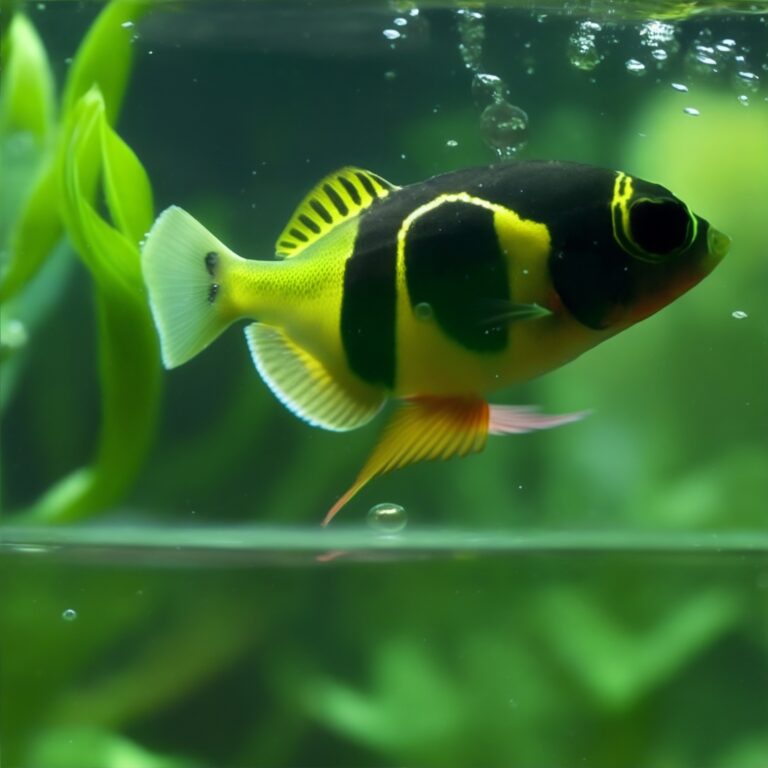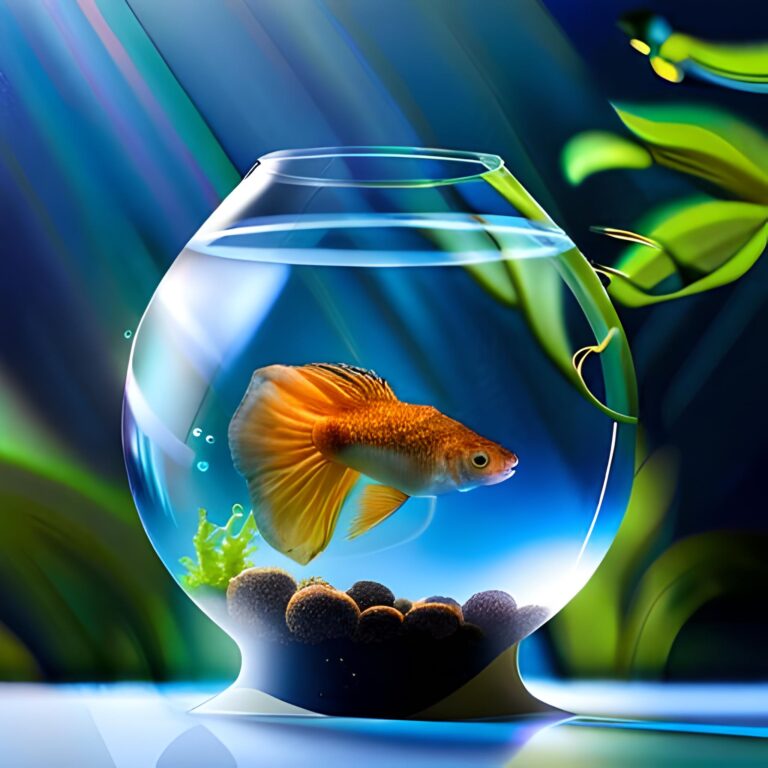Discover How Guppies Sleep and Ensure Optimal Rest for Your Guppy Fish
As a proud guppy fish owner, it’s important to understand the sleep patterns of these vibrant and delightful creatures. While it may seem like guppies are in a constant state of activity, they do indeed require restful sleep to maintain their overall health and well-being. In this article, we will delve into the fascinating world of guppy sleep, exploring the questions of whether they sleep, how they sleep, and the factors that can affect their sleep.
Guppies, scientifically known as Poecilia reticulata, are small tropical fish that originate from the freshwaters of South America. These colorful and energetic swimmers are highly popular among aquarium enthusiasts due to their striking appearances and lively personalities. While they are known for their active nature, guppies, like any living creature, need to rest and rejuvenate.
Understanding Guppy Sleep Behavior
As an avid guppy fish enthusiast, it’s important to delve into the fascinating world of guppy sleep behavior. While these vibrant and lively creatures may seem to be in constant motion, they do indeed require restful sleep to maintain their overall health and well-being.
Do guppies sleep?
The answer is a resounding yes! Despite their constant swimming and activity, guppies do have periods of sleep. However, their sleep patterns may differ from those of other animals. Unlike humans who require several hours of uninterrupted sleep, guppies engage in short bursts of sleep throughout the day and night.
How do guppies sleep?
Guppies exhibit a unique sleep behavior known as “torpor.” During torpor, guppies enter a state of reduced activity and metabolism, allowing them to conserve energy. This sleep mode enables them to rest and recharge, even while remaining partially alert to their surroundings.
When guppies enter torpor, their movements become slower and more subdued. They may find a quiet spot in the aquarium, such as behind plants or in a hiding place, where they can feel secure and protected. While in this state, their breathing slows down, and their heart rate decreases, indicating a state of relaxation and rest.
Factors that affect guppy sleep
Just like humans, guppies’ sleep is influenced by various factors. It’s essential to understand these factors to ensure optimal sleep for your guppy fish. Here are a few key considerations:
1. Light Cycle: Guppies are diurnal creatures, meaning they are most active during the day. To promote healthy sleep, it’s crucial to maintain a consistent light cycle in their aquarium. Mimicking natural daylight patterns by providing 12 hours of light and 12 hours of darkness can help regulate their sleep-wake cycle.
2. Water Quality and Temperature: Guppies are highly sensitive to their environment. Poor water quality or extreme temperature fluctuations can disrupt their sleep patterns. Ensure that the water in the aquarium is clean, properly filtered, and maintained at an appropriate temperature for their species.
3. Hiding Places: Guppies seek shelter and security during sleep. Providing ample hiding places, such as plants, caves, or decorations, allows them to feel safe and comfortable. These hiding spots also simulate their natural habitat, creating a conducive environment for restful sleep.
4. Disturbances: Guppies are easily startled and can be sensitive to disturbances. Loud noises, sudden movements, or excessive handling near their aquarium can disrupt their sleep. It’s crucial to create a calm and peaceful environment to minimize disturbances during their sleep.
By understanding guppy sleep behavior and considering these factors, you can create an optimal sleep environment for your guppies. In the next section, we will explore practical tips on how to achieve this, ensuring that your guppies enjoy restful sleep and maintain their vibrant and active nature.
Continue reading: Creating an Optimal Sleep Environment for Guppies
Creating an Optimal Sleep Environment for Guppies
Provide hiding places
When it comes to ensuring a good night’s sleep for your guppy fish, providing hiding places is essential. Guppies are naturally skittish creatures and feel more secure when they have secluded spots to retreat to. These hiding places can be in the form of aquatic plants, decorative caves, or even artificial structures designed specifically for fish.
By offering hiding places, you give your guppies the opportunity to escape from potential predators or other tankmates that might cause them stress. It also helps mimic their natural habitat, where they would typically seek cover among vegetation or other objects.
Maintain a consistent light cycle
Just like humans, guppies have an internal clock that regulates their sleep-wake cycle. To ensure an optimal sleep environment for your guppies, it is important to maintain a consistent light cycle. This means providing them with a regular day and night schedule.
During the day, expose your guppies to moderate lighting that simulates daylight. You can achieve this by using a fish tank light or positioning the tank near a natural light source. In the evening, gradually dim the lights or turn them off completely to signify nighttime.
By establishing a regular light cycle, you help your guppies differentiate between day and night, allowing them to adjust their activity levels accordingly. This promotes a more natural sleep pattern and helps them maintain a healthy sleep-wake rhythm.
Ensure water quality and temperature
The quality of the water in your guppy tank plays a significant role in their overall well-being, including their sleep quality. To create an optimal sleep environment, it is crucial to maintain excellent water quality. Regularly test the water parameters such as pH, ammonia, nitrite, and nitrate levels to ensure they are within the appropriate range for guppies.
Additionally, maintaining a stable water temperature is essential. Guppies prefer water temperatures between 75°F and 82°F (24°C and 28°C). Sudden fluctuations or extremes in temperature can cause stress and disrupt their sleep patterns. Consider using a reliable aquarium heater to maintain a consistent water temperature.
When the water quality and temperature are optimal, your guppies will feel more comfortable and be able to rest peacefully, leading to healthier sleep patterns.
Minimize disturbances during sleep
Just like humans, guppies need an environment free from disturbances to achieve restful sleep. To create an optimal sleep environment for your guppies, it is important to minimize disturbances during their sleep period.
Avoid sudden loud noises or vibrations near the tank that could startle your guppies. Place the tank in a quiet area of your home where they won’t be disturbed by excessive foot traffic or other household activities. Also, consider covering the tank with a light-blocking aquarium cover during the night to reduce external stimuli.
Additionally, be cautious with tank maintenance activities during their sleep period. Try to schedule water changes, filter cleaning, and other necessary tasks for times when your guppies are awake and active. This way, you can avoid disrupting their sleep and ensure they get the undisturbed rest they need.
By providing hiding places, maintaining a consistent light cycle, ensuring water quality and temperature, and minimizing disturbances during sleep, you can create an optimal sleep environment for your guppies. Remember, a well-rested guppy is a happy and healthy guppy!
Continue reading about signs of healthy sleep in guppies or learn more about common sleep-related issues in guppies.
Signs of Healthy Sleep in Guppies
As responsible guppy owners, it’s essential to understand the signs of healthy sleep in our finned friends. Just like humans, guppies require proper rest to maintain their overall well-being. By observing their sleep patterns and behavior during wakefulness, we can ensure that our guppies are getting the rest they need to thrive.
Normal sleep patterns are a key indicator of healthy sleep in guppies. Typically, guppies will display periods of restful sleep interspersed with periods of activity. During sleep, you may notice that your guppies become less active, with slowed movement and reduced responsiveness to stimuli. They may also find a cozy spot to rest, such as hiding among plants or seeking shelter in caves.
On the other hand, when guppies are awake, they should exhibit active and alert behavior. Healthy guppies will swim energetically, explore their surroundings, and engage with their tank mates. They should be responsive to feeding and show curiosity towards their environment.
It’s important to note that each guppy may have slightly different sleep patterns and levels of activity. Some guppies may be more active during the day, while others may prefer to be active at night. As long as their sleep patterns align with their natural instincts and they exhibit active behavior when awake, you can be confident that your guppies are experiencing healthy sleep.
If you notice any significant changes in your guppies’ sleep patterns or behavior, it could be an indication of an underlying issue. Factors such as stress, illness, or poor water conditions can affect their sleep. In such cases, it is recommended to consult a veterinarian to ensure the well-being of your guppies.
By observing your guppies’ normal sleep patterns and active behavior, you can gauge their overall health and well-being. Providing them with a suitable environment and addressing any sleep-related issues promptly will contribute to their longevity and happiness.
Now that we’ve explored the signs of healthy sleep in guppies, let’s move on to discussing common sleep-related issues that guppies may encounter. Stay tuned for the next section where we delve into insomnia, sleep disturbances, and sleep disorders in guppies.
Continue reading about common sleep-related issues in guppies
Common Sleep-related Issues in Guppies
Guppies, like any other living creature, may experience sleep-related issues from time to time. While sleep disturbances in guppies are not as widely studied as in humans, there are a few common issues that guppy owners should be aware of. Understanding these issues can help you provide the necessary care and support for your beloved aquatic pets.
Insomnia and Sleep Disturbances
Insomnia, the inability to fall asleep or stay asleep, can affect guppies just like it can affect humans. Various factors can contribute to insomnia in guppies, including environmental changes, improper tank conditions, or even stress. If you notice your guppy displaying unusual behavior such as restlessness, excessive swimming, or difficulty settling down at night, it could be a sign of insomnia.
To address insomnia in guppies, it’s important to identify and address the underlying causes. Ensure that your guppy’s tank is properly maintained, with appropriate water quality and temperature. Providing hiding places and reducing external disturbances during sleep can also help create a calm and peaceful environment for your guppy to rest.
Sleep Disorders in Guppies
While sleep disorders are not as extensively studied in guppies as they are in humans, it’s possible for these small fish to experience sleep disorders. Sleep disorders can manifest in various ways, such as excessive sleeping, irregular sleep patterns, or even abnormal behaviors during sleep. Guppies may also experience sleep apnea, a condition characterized by interrupted breathing during sleep.
If you observe any unusual sleep patterns or behaviors in your guppy, it’s essential to consult a veterinarian who specializes in fish or aquatic animals. They can provide you with expert advice and guidance to help diagnose and treat any potential sleep disorders your guppy might be facing.
Understanding and addressing sleep-related issues in guppies is crucial for ensuring their overall well-being and maintaining optimal health. By providing a suitable sleep environment, monitoring their sleep patterns, and seeking professional guidance when needed, you can help your guppies enjoy restful and rejuvenating sleep, contributing to their overall happiness and vitality.
For more information on guppy care and related topics, check out our articles on how many guppies in a 20 gallon tank and how many babies do guppies have.
Tips for Promoting Good Sleep in Guppies
As a responsible guppy fish owner, it is crucial to ensure that your finned friends get the restful sleep they need to thrive. Just like humans, guppies require proper sleep to maintain their overall health and well-being. In this section, we will explore some tips to help you promote good sleep in your guppies.
Provide proper nutrition
A well-balanced diet is essential for your guppies’ sleep quality. Make sure to feed them a varied diet consisting of high-quality fish food, such as flakes, pellets, or freeze-dried options. These foods should contain all the necessary nutrients and vitamins that guppies need to stay healthy. Furthermore, consider supplementing their diet with live or frozen foods like brine shrimp or daphnia, which provide additional nutrients and mimic their natural feeding behavior.
Regular exercise and stimulation
Guppies are active little swimmers and need plenty of exercise to stay fit and sleep well. Providing them with a spacious tank with ample swimming space will encourage them to stay active during the day, promoting better sleep at night. You can also add decorations and plants to the tank, creating an engaging environment that stimulates their natural instincts. By incorporating these elements, you can ensure that your guppies have the opportunity to exercise and explore their surroundings.
Maintain a stress-free environment
Just like humans, guppies need a calm and stress-free environment to sleep peacefully. Avoid sudden loud noises or vibrations near their tank, as these can startle and disturb them. Additionally, ensure that the water conditions in the tank are optimal. Regularly check the temperature, pH levels, and ammonia levels to maintain a stable and comfortable habitat for your guppies. A stressful environment can disrupt their sleep patterns and lead to health issues.
Consult a veterinarian if sleep issues persist
If you’ve followed all the aforementioned tips and your guppies still experience sleep disturbances or exhibit abnormal sleep behavior, it may be wise to consult a veterinarian who specializes in fish health. They can provide expert advice and address any underlying health issues that may be affecting your guppies’ sleep. Remember, early intervention is crucial in ensuring the well-being of your beloved aquatic companions.
By implementing these tips, you can create an optimal sleep environment for your guppies, helping them get the rejuvenating rest they need. A well-rested guppy is a happy and healthy guppy, so remember to provide them with proper nutrition, regular exercise, a stress-free environment, and seek professional guidance when needed.
Now that we’ve explored the tips for promoting good sleep in guppies, let’s move on to the next section to learn about the signs of healthy sleep in these vibrant little fish. Stay tuned!
Internal links:
Conclusion
In conclusion, understanding and ensuring optimal sleep for your guppy fish is crucial for their overall health and well-being. While guppies may not sleep in the same way humans do, they still require periods of rest to maintain their vitality and immune system.
By providing suitable hiding places, maintaining a consistent light cycle, and ensuring proper water quality and temperature, you can create an environment that promotes restful sleep for your guppies. Minimizing disturbances during sleep is also essential, as any disruptions can interrupt their sleep patterns and lead to stress.
Observing your guppies for signs of healthy sleep, such as normal sleep patterns and active behavior during wakefulness, can indicate that they are getting the rest they need. However, if you notice any sleep-related issues, such as insomnia or sleep disturbances, it is important to address them promptly to prevent further complications.
To promote good sleep in your guppies, provide them with a balanced diet, regular exercise, and stimulation. Maintaining a stress-free environment is also crucial, as stress can negatively impact their sleep quality. If sleep issues persist despite your efforts, consulting a veterinarian who specializes in fish health can provide valuable insights and guidance.
Remember, a well-rested guppy is a happy and healthy guppy. By prioritizing their sleep needs and implementing the tips mentioned in this article, you can ensure that your guppies thrive in their aquatic habitat.
For more information on guppies and their care, feel free to explore the following articles on our website:
- How Many Guppies in a 20 Gallon Tank
- How Many Babies Do Guppies Have
- Will a Betta Fish Kill a Guppy
- Are Guppies Schooling Fish
- Are Guppies Aggressive
- Do Guppies Need a Filter
- How Long Does It Take for Guppies to Give Birth
- How Many Guppies in a 3 Gallon Tank
- Can Angelfish Live with Guppies
- Can Guppies Live Alone
- Do Guppies Need a Bubbler
- Will Goldfish Eat Guppies


